Jason Micheli's Blog, page 72
June 24, 2023
What's Theology Got to Do with It?
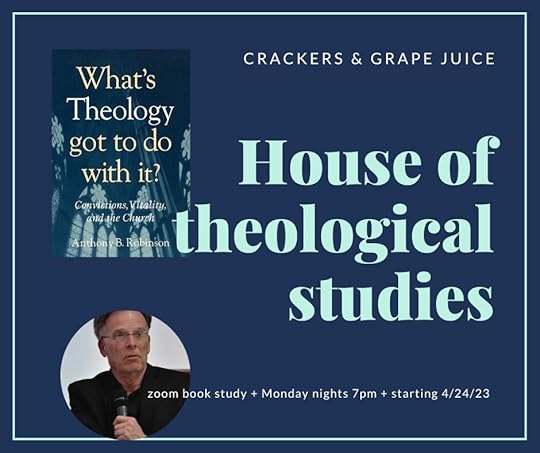
Tamed Cynic is a reader-supported publication. To receive new posts and all content, consider becoming a paid subscriber.
Here’s one of our recent Monday night sessions, discussing our friend Tony’s great book, What’s Theology Got to Do with It?
In talking about the humanity of God, Tony shared about a particularly harrowing time as a father. It’s a vulnerable and hopeful story so give it a listen.
From that section of his book, Tony writes:
If we do not face up to our own brokenness, however, we cannot appropriate the real blessings of God’s embrace of our full humanity in Jesus. Or to put it in a more positive way, by his full embrace of our finite and limited humanity, Jesus makes of our humanity a blessing and not a curse.
We need not flee the inherent vulnerability of being human in order to follow Jesus. Or to put it a slightly different way, the world is not divided between the sinful and the virtuous. It divides between those who are aware of their sin and their need for grace and those who are without awareness of their true condition.
When the awareness that we all stand in need of grace is absent, it fundamentally skews the ministry and health of the church. We become blind to our own need for forgiveness and healing. We pretend that we have it together. We are happy (or not) to help others, but we need no real help ourselves, thanks very much! In this view, Christians are better sorts of people, not sinners in need of God and God’s grace. Author, theologian, and teacher Roberta Bondi says that all too often the church permits and encourages us to be our “noble selves,” “our cleaned up and socially presentable selves.” That is not without value. We do need to be reminded of our better natures.
But there is a problem with an unrelieved emphasis on our noble selves. It does not so readily invite and include our real selves. And, observes Bondi, the real us is who God wants and who God loves. In Christ, God has embraced our real and full humanity, warts and all.
What became evident in the course of our family’s experience with mental illness is a pattern of cover-up in the church. We pretend to be okay. We cover up our own brokenness and sin. Our family realized we too had lived, in some measure at least, with the myth of the perfect family. Such pretense was no longer an option. We clung to grace. We drew near to the crucified and risen Christ in new ways.
When our family shared our experience in what I hope were judicious and appropriate ways, and others came forward to speak about their similar experiences, unexpected things began to happen. Honesty and intimacy in the congregation moved to a deeper level. The congregation’s caring shifted somehow from what might be called “we strong people will care for you needy people;” to “we are one another’s companions in the midst of life’s challenges.” Moreover, this more authentic type of community and bringing our fuller selves to God and to one another eventually led to an amazing new congregational ministry.
June 22, 2023
Spitting in Sin's Face

Tamed Cynic is a reader-supported publication. Pay it forward. To receive new posts and all content, consider becoming a paid subscriber.
Here’s a sermon from a few years ago on Sunday’s lectionary epistle reading from Romans 6.
The podcast posse and I have a collection of sermons on Romans. Check it out.
“Whoever has died with Christ [through baptism] is free from sin.”
Speaking of death—
A year ago this week, I woke up from abdominal surgery to a doctor telling me I had something called Mantle Cell Lymphoma, this incredibly rare, aggressive cancer with long odds for a happy ending. I don’t want to be melodramatic about it, but I thought I was going to die.When I realized I wasn’t going to die, when I got my bone marrow results back a few weeks ago, and I realized the inevitable wasn’t yet, I was so freaking grateful.
Bowled over with gratitude. To God.
I felt so thankful that I promised a vow to God. I swore an oath to God. For the gift of my life, I would offer the gift of my faithfulness. It’s true. I stared at myself in the mirror at my oncologist’s mens room right after I received my results. I splashed water on my face to make sure I wasn’t daydreaming. I stared at myself in the mirror and I swore, from here on out, I would be a perfect Christian.No more snark or sarcasm. No more dark cynicism. No more cussing or anger. No more can’t be bothered apathy or little white lies.
God had rescued me from literal death.
So I promised to the mens room mirror, “I will never sin again.”
And I meant it. I was doing a pretty job with it until I walked out of the bathroom and over to the elevator.
June 21, 2023
A Death has Intervened
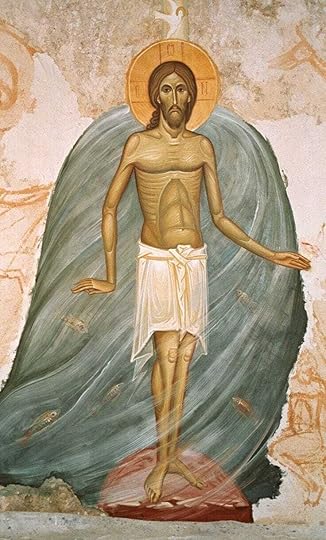
Tamed Cynic is a reader-supported publication. To receive new posts and all content, consider becoming a free or paid subscriber.
Romans 6.1-11
Despite the dogmatic strictures laid out by various tribes, the New Testament sets forth no single interpretation of baptism. From John the Baptizer to Paul the Apostle, baptism is both pure promise-making or indicative-assuming summons. Depending on the scriptural text, baptism is an event of the Holy Spirit that itself saves unconditionally or a pledge of allegiance to Christ the King. Baptism is an act of individual repentance or it’s an act applicable and effective for that aforementioned individual’s entire household.
Generally, however, the scriptures permit two distinctions:
To those not yet baptized, the sacrament is pure gospel— baptism saves.
To those already baptized, the saving fact of it now interprets existence as a whole.
Both emphases, it’s crucial to note, seek to prevent faith becoming a matter of individual subjectivity. You’re not saved, in other words, because you have decided to follow Jesus. In both instances above, baptism fundamentally names an alteration of the convert’s reality— a change in reality made so by the agency of the Spirit. The Holy Spirit is the fact of baptism whose effect is an alteration of the recipient’s reality.
Baptism is for preaching, the Reformers insisted.The offensive, gratuitous, and unconditional nature of the gospel is so just to the extent that the church recognizes baptism as an objective event not a subjective one.
That is, baptism saves.
Full stop.
While the New Testament knows no single presentation of baptism, the more extensive treatments of it concern baptism’s past tense. For example, Paul addresses this coming Sunday’s lectionary text to those already baptized. Having handed over the goods of the gospel of grace, Paul anticipates the obvious next question, “If we’re just going to be forgiven anyways, why can we not continue indulging ourselves?” Robert Jenson jokes that the first answer to Paul’s anticipated question ought to be, “Because God will punish those who ask such stupid questions.” Even though such a retort is not without gospel wisdom, the doctrine of justification refuses it as an entire answer. The “It’s a stupid question” response fails to pay attention to baptism’s past-tenseness in Paul’s argument— which, in fact, is its argumentative force.
“If we’re just going to be forgiven anyways, why can we not continue indulging ourselves?”
In writing to the church at Rome, Paul seeks to remove sin and good works both from the sphere of subjective human choice.
June 20, 2023
Hagar, Ishmael, and the Trinity

Tamed Cynic is a reader-supported publication. To receive new posts and all content, consider becoming a paid subscriber.
“The word is with God and just so is God.”
— John 1
Genesis 21
It is perhaps not immediately obvious that this Sunday’s Old Testament lectionary displays an instance of the doctrine of the Trinity.
Scripture knows no other instantiations of its doctrines than the kind we find in Genesis 21. That we do not so see the story of Hagar and Ishmael simply reveals the extent to which the church has accepted modernity’s limitations on the formulations of doctrine.
June 19, 2023
Wake Up to Wonder

Tamed Cynic is a reader-supported publication. To receive new posts and all content, consider becoming a paid subscriber.
Here is a video recording for a forthcoming podcast episode with Karen Wright Marsh. Karen joined us to discuss her soon-to-be-released book, Wake Up to Wonder: 22 Invitations to Amazement in the Everyday.
Grounded in the embodied spirituality of Christians who have lived it best, Karen’s new book introduces 22 accessible practices to help you find deeper meaning and purpose in your everyday life.
Karen is the founding director of Theological Horizons, a ministry at the University of Virginia (Wahoowa!) that hosts lectures, spiritual studies, dialogues, and mentoring initiatives. She is the author of Vintage Saints and Sinners: 25 Christians Who Transformed My Faith, which was named an Outreach Resource of the Year, a Logos Booksellers Book of the Year, and a Foreword INDIES finalist. Karen holds a degree in philosophy from Wheaton College and a degree in linguistics from the University of Virginia. She lives with her professor husband, Charles Marsh, at the Bonhoeffer House in Charlottesville, Virginia.
I hope you enjoy the conversation!
 Read Tamed Cynic in the Substack appAvailable for iOS and AndroidGet the app
Read Tamed Cynic in the Substack appAvailable for iOS and AndroidGet the app
June 18, 2023
Leave Left Behind Behind
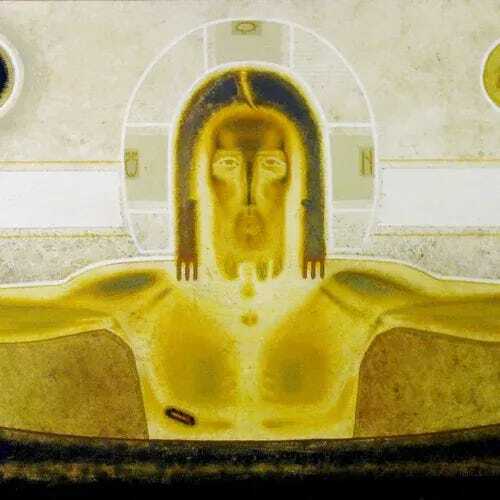
Tamed Cynic is a reader-supported publication. To receive new posts and all content, consider becoming a free or paid subscriber.
Revelation 1.1-20
The two words most often associated with John’s Apocalypse appear no where in it: antichrist and rapture. Neither word occurs anywhere in the Book of Revelation. Nevertheless, it is indeed a bewildering book populated by seven eyed sheep and a woman clothed with the sun, dragons and beasts from the sea. Of the four hundred and four verses of the Lord’s Unveiling to John, two hundred and seventy-eight of them contain one or more allusions to the Old Testament.
The Spirit of Jesus shows the prophet John what the Spirit of Jesus had previously shown the prophets of old.Revelation is largely a repackaging of Israel’s scriptures; nonetheless, Revelation renders those scriptures strange such that it can be hard to see what bowls and seals and horsemen have to do with an empty grave. The Coptic Orthodox Church reads the Apocalypse in its entirety every year on the eve of Easter— the whole book, all twenty-two chapters. It takes an hour. Even so, it can be difficult to hear these visions as good news.
Therefore, as we set forth into the Apocalypse, in order that we do not drift away from the gospel— it’s only wise and proper— first things first, I need to hand over the goods. I need to deliver to you a promise. Unless you have received a promise from Jesus Christ, unless you’re holding fast to the gospel promise, then the visions and auditions unveiled to John will disorient you and leave you feeling unmoored from the Love with which we are loved. Without a firm grip on the gospel, you are liable to hear what the Seer sees as threat not promise.
So…
First things first—In the name of Jesus Christ and by his authority alone, I declare for you that the apocalypse has already come to you.You have died.
You have already died the only death that ultimately matters.
Remember—
The exalted Son of Man, who the Spirit carries John up to see, this Jesus clothed with a golden sash, whose hair is as white as wool, whose eyes are as a flame of fire, whose voice is the roar of many waters, and whose feet— feet that were once pierced and broken by hammer and nail— are now as strong as burnished bronze, this Jesus is the Jesus who appeared to Stephen upon his stoning.
This is the Risen Jesus who blinded Saul on the road to Damascus.
This is the Jesus who gives to Paul the promise to announce to the Church at Corinth, “Because the one man died for all, all have died.”
All have died with him. All have died in him. All have died to sin.
“He loosed us from our sins in his blood,” John writes in Revelation 1.5
“If anyone is in Christ,” Paul writes, “he is a new creation. The old creation has passed away; behold, the new has come.”
In other words, the apocalypse has already come to you.
Therefore, when it comes to John’s forthcoming visions of God’s wrath and his imminent auditions of divine judgment, fear not.
As the Son of Man says to the Seer, “Fear not!”
Hear the good news:The rumors of grace, pardon, and the redemption of all things are true.Everything is going to be ok.You are safe in Christ. You are free. You are free to enjoy your forgiveness because Jesus, the Friend of Sinners, is the Exalted Son of Man.
Fear not!
Everything is going to be ok. The apocalypse has already come to you. You have died. By water and the Spirit, you have died the only death that ultimately matters. And this same Jesus, with whom and in whom you have died already, holds the keys of hell.
This same Jesus, who became our neighbor and loved us as himself, even while we were yet his enemies— loved us even unto a cross, is the entirety of existence, the totality of all that is. “The first and the last,” he unveils to John at the beginning. “The Alpha and the Omega,” he reveals at the end.
Everything is going to be okay because he will be all in all. The apocalypse has already come to you. And nothing you do can undo it.
Because notice—
As fixed to him as his burnished feet and his face shining like the sun, the Exalted Son of Man appears everywhere surrounded by seven lampstands. They are an irremovable part of him. The lampstands, Jesus unveils to John, are his body. The church.
Thus, there is now no Risen Jesus without you.The Father desires the Son, but there is now no Son apart from his body. Therefore, you are home free. Everything is going to be ok.Having handed over the goods up front, I invite you now to listen to the Word of God as it’s found in the Apocalypse to John, 1.9-20:
I John, your brother and partaker with you in the tribulation and kingdom and patience which are in Jesus, was in the isle that is called Patmos, for the word of God and the testimony of Jesus. I was in the Spirit on the Lord’s day, and I heard behind me a great voice, as of a trumpet saying, What thou seest, write in a book and send it to the seven churches: unto Ephesus, and unto Smyrna, and unto Pergamum, and unto Thyatira, and unto Sardis, and unto Philadelphia, and unto Laodicea.
And I turned to see the voice that spake with me. And having turned I saw seven golden candlesticks; and in the midst of the candlesticks one like unto a son of man, clothed with a garment down to the foot, and girt about at the breasts with a golden girdle. And his head and his hair were white as white wool, white as snow; and his eyes were as a flame of fire; and his feet like unto burnished brass, as if it had been refined in a furnace; and his voice as the voice of many waters. And he had in his right hand seven stars: and out of his mouth proceeded a sharp two-edged sword: and his countenance was as the sun shineth in his strength.
And when I saw him, I fell at his feet as one dead. And he laid his right hand upon me, saying, Fear not; I am the first and the last, and the Living one; and I was dead, and behold, I am alive for evermore, and I have the keys of death and of Hades.
Write therefore the things which thou sawest, and the things which are, and the things which shall come to pass hereafter; the mystery of the seven stars which thou sawest in my right hand, and the seven golden candlesticks. The seven stars are the angels of the seven churches: and the seven candlesticks are seven churches.
This is the Word of God for the People of God.
Thanks be to God.
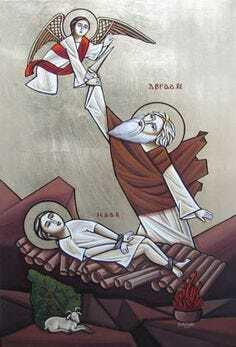
There is an old joke that insists people don’t go to church because of the people who do; likewise, I think a good many people steer clear of the Book of Revelation because of the people who have hyper-canonized it. But there is no reason to abandon the Apocalypse to the Christian fringe. In fact, once you leave Left Behind behind, Revelation’s continuity with Israel’s scriptures becomes altogether unavoidable.
Indeed most of the narrative details in John’s prophetic call echo Old Testament elements.
For instance, like the prophet Amos, John sees the voice of God.
“And I turned about,” John writes, “to look at the voice which was speaking to me.”
Earlier in the passage, the Lord’s self-ascription (“the One Who Is and Who Was and Who is Coming) recalls the unutterable name God reveals to Moses at the Burning Bush. The seven spirits and seven eyes and seven lampstands form the vision given to the prophet Zechariah. The Lord Jesus’s feet and eyes and hair and dress all resemble the Ancient of Days who was disclosed to the prophet Daniel. And the voice that roars like many waters is the same voice that attends the arrival of God’s glory to the prophet Ezekiel by the waters of Babylon. Even Jesus’s face shining like the sun— there is nothing new here.
And, of course, if Jesus has always been in the Trinity, then we should expect to find this continuity between the Risen Jesus unveiled to John and the Risen Jesus who appeared to Israel’s prophets from the last future.
What is new in this (the New Testament’s only) prophetic book, what is unique and different, is the Apocalypse’s treatment of time, its palpable and harried sense that the Fulfillment is nigh.
John the Beloved Disciple writes down his visions and auditions and sends them out to the churches not only because the Lord instructs him to do so but because he believes the matter is urgent.
Time is short.John’s convinced the End is imminent.“The time is near,” the first beatitude announces in the Apocalypse’s prologue.
“Write then what you see,” Jesus commands John, “for these things are about to come to pass.”
Soon and very soon.
Perhaps not surprisingly, ever since John wrote down what he saw, Jesus’s disciples, over and again, have ignored the admonishment that Jesus gave to his first disciples.
In Mark’s Gospel, Jesus predicts the destruction of the temple, and the twelve disciples respond by asking the obvious question.
“When?”
“‘Tell us, when will this be, and what will be the sign?””
And immediately Jesus cracks the whip, chastising his disciples “Do not be led astray by asking “When?””
“Only the Father knows the day and the hour,” Jesus warns them.
That is—
“When?” is a question that cannot be answered; therefore, “When?” is a question that should not be asked.Do not be led astray by the when question, Jesus warns. Do not get distracted, trying to read the signs of the times, Jesus scolds. Do not get preoccupied, attempting to make predictions, Jesus reprimands.
In other words, leave Left Behind behind.
But no sooner does John the Seer write down what he saw than many of the believers for whom he wrote grew distracted by that very question.
For example, the year 500 AD proved too auspicious to avoid speculation. Long before Dan Brown or that purple haired lady on the Trinity Broadcasting Network, ancient Church Fathers— legitimate thinkers and leaders— like Hippolytus of Rome and Irenaeus of Lyon predicted Christ would come again in the year 500. And they attempted to prove their prediction by “decoding” the dimensions of Noah’s ark.
Pope Sylvester II predicted the apocalypse would occur at the turn of the first millennium, Y1K. When Jesus did not come again to judge the living and the dead, Sylvester and others regrouped and insisted that the only detail they’d gotten wrong was the starting point. The End would come not a thousand years after Jesus’s birth as they’d thought but a thousand years after his death, 1033 AD.
Joachim of Fiore was a Catholic mystic who discovered what he called the secret “eternal gospel” in the Book of Revelation, 14:6. According to him, Christ would come back and inaugurate the Age of the Spirit in 1260 AD.
Flash forward a couple hundred years and it gets worse.
Thomas Muntzer was an Anabaptist in Germany— a Mennonite— who scoured the scriptures to interpret the signs of his time. Muntzer became convinced that the world teetered at a tipping point. He predicted that the New Age would arrive in the year 1525. The revolutionary furor his prediction unleashed ignited a violent rebellion by the peasants in central Germany. The revolt was quelled with equally great violence. The when question led Thomas Muntzer was led astray and before he knew it ploughshares and pruning hooks were being beaten into swords.
John Wesley, the founder of the Methodist movement— otherwise, kind of a normie guy, he got led astray too. He read a verse— a single verse— in Revelation and came to the conclusion that the apocalypse would be in 1836.
Not long after Wesley, a Baptist preacher named William Miller led a movement of believers called the Millerites. William Miller got more specific than any Christian heretofore had dared. Based on his idiosyncratic reading of Daniel 8, William Miller insisted that the Lord would return (to upstate New York) on October 22, 1844.
As it turns out, the most remarkable event that happened on October 22, 1844 was that President James Polk had urinary bladder stones removed. Well, the bladder stones came in second place after what the press dubbed “The Great Disappointment” referring to Miller’s failed prediction. The Great Disappointment didn’t stop William Miller though; his movement of Millerites became known as the Seventh Day Adventist Church.
Christians on cable television went nuts as the year 2000 approached.
When Barack Obama became president, Jerry Falwell predicted the End was nigh.
And maybe you recall—
Family Radio host and self-taught Bible expert, Harold Camping, predicted the rapture would happen on May 21, 2011, paving the way for the destruction of the world’s remaining sinners a few months later on October 21, 2011. Harold Camping led hundreds, likely more, so astray they quit their jobs, left their families, sold their homes, and cashed out their 401Ks in anticipation of the end times. As a result, one of Camping's coworkers committed suicide.

When it comes to Christ’s Second Advent, there’s a better question to ask than “When?” Not only is it a better question to ask, it’s a question Christ does not forbid us to ask. The question we should ask is not “When?” but “Why?”
Why has the End with a capital E not yet come?Why has Christ not yet come again?Why does God give more time?Remember—
The Bible is absolutely unique in the history of religion. Unlike the paganism of ancient Rome and Greece, the scriptures do not view the universe as eternal. Likewise, the Bible departs from eastern religions which understand existence as circular, an endless cycling loop of reincarnations. No, the Book of Genesis and the Gospel of John alike claim that creation had a beginning. Before anything was God spoke all that is into existence. Creation had a beginning and, thus, creation will have an end. Time, according to Christianity, is less like the reliable constancy of grandfather clock and more like the sand in an hour glass.
Time will run out.Just as there was a first day, one day there will be a last day. God is bringing history to a head. This is what Paul means when he writes to the Church at Rome, “Your salvation is nearer than when you first believed.” As we pray at the table, one day Christ will come back in final victory, time will be transformed into glory, and we will, as the catechism puts it, enjoy him forever.
Why the meantime?Why does time not simply stop? Why does God let history continue? What else is there for God to do? Christ himself says from his cross, “It is finished.” And on his way to the cross, Jesus declares, “Take heart. I have overcome the world!”
So why?
Why does God give us more time?
What else is there for God to do?
He’s already given himself for sins, once for all. As the author of the Book of Hebrews says, Christ our Great High Priest has offered a perfect sacrifice such that, now, his work forever complete, he sits at the Father’s right hand, resting with his feet propped up on his enemies— Sin, Death, and the Devil. They are now his ottoman. If there is therefore now nothing in all of creation that can separate us from the love of God in Christ Jesus our Lord, what in the world is left for God to do?
Why the delay?
Why does God give us more time?
What is still going on that absolutely must be done?

When I was a student at Princeton, I attended a series of lectures the late Lutheran theologian, Robert Jenson, delivered for undergraduates and faculty members. Though the attendees recognized that Jenson was one of the most brilliant theologians America has ever produced, not every one in the lecture hall was open or hospitable to the claims of Christianity.
Some listeners, though curious, were openly hostile to the gospel.
One skeptical student in the audience persisted in trying to poke holes in Jenson’s arguments.
“Doesn’t the New Testament indicate that the world was about to end? Didn’t Paul and the apostles expect Christ to return in their lifetimes? Didn’t Jesus even suggest the apocalypse was imminent? Why has God delayed?”
And Jenson revealed the slightest crease of a smile, and he responded nonchalantly to the skeptic’s question with a brilliant six word reply.
“Why has God waited?His answer:1) Because2) He3) Wants4) To5) Include6) YouWhy the meantime?Because he wants to include you.
He delays the End so that by water and the spirit the apocalypse of saving faith might come to you too.
He wants you to hear that heaven is a gift everyone already has by the death of the lamb slain from the foundation of the world. He wants you to hear that your sinful deeds will not be judged because the whole world died to the law by the Body of Christ. He wants you to hear your good deeds are not required nor will they be rewarded for Christ is the end of the law; so that, everyone who believes may be justified. He wants you to reach out by faith and cling to this, the only promise that can save you.
Why does God give us more time?
What is still going on that absolutely must be done?
The proclamation of the promise.
The gospel.
The word of the cross.
Just wrap your head around it—The only reason left for history to happen is simply for you and I to tell another that Jesus lives with death behind him.And therefore his promises— of grace and pardon and the redemption of all things— are irrevocable because they are not bounded by death.
That’s not my opinion, and it’s not some dead theologian’s interpretation. This is red-letter, straight from the lips of Jesus. Christ has not yet come again because in this meantime Christ has given us a commission.
God has given us time to proclaim, in word and deed, the glad tidings of his resurrection from the dead. The good news— not only is this message the main thing, it’s literally the only reason any of us are still here. The hour glass would be empty by now except for the fact that God wants to include more than just you.
The promise for you— it’s also our vocation.
Maybe you’ve read it.
Ernest Hemingway wrote a short story for Esquire magazine in 1936 entitled, “The Horns of the Bull.” Hemingway later changed the title to “The Capital of the World” for his collection The Fifth Column.
Set during the Spanish Civil War, the story features a young waiter named Paco, a common Spanish name. Paco aspires one day to be a matador like the men he serves at his restaurant. Paco, the reader learns, ran away from home after a bitter falling out with his father. Paco’s father, however, is determined to find his lost but loved child and to bring him back home. After combing the streets and shops of Madrid to no avail, Paco’s father grows desperate. He spares no expense, taking out a full-page advertisement in the newspaper.
The ad is as plain and clear as a street sign.
The ad reads simply, “PACO, MEET ME AT THE HOTEL MONTANA. NOON TUESDAY. ALL IS FORGIVEN. PAPA.”
When Paco’s father arrives at the hotel plaza at noon on Tuesday, he cannot believe his eyes. A squadron of police officers has been dispatched there to control a crowd of nearly a thousand young men, all named Paco, all of them looking to reconcile with their father.
All of them needed to hear, longed desperately to hear “ALL IS FORGIVEN.”
Jesus warns us not to get distracted trying to read the signs of the time because we’re supposed to be the sign the Father has posted in the world.
At great cost.
And the Father has given us literally all the time in the world to be that sign.
We are the sign that says: YOUR FATHER IS NOT MAD AT YOU— HE’S BEEN SEARCHING FOR YOU. YOU’RE SAFE TO COME HOME. ALL IS FORGIVEN.
And any other contradictory messages we put out there in the world, we’re WASTING TIME.
 Read Tamed Cynic in the Substack appAvailable for iOS and AndroidGet the app
Read Tamed Cynic in the Substack appAvailable for iOS and AndroidGet the app
June 17, 2023
How to Spot a False Gospel
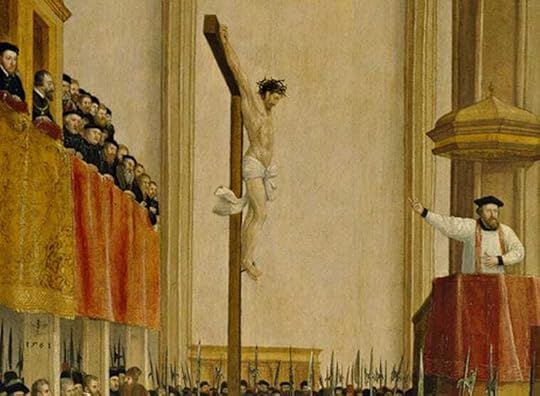
Tamed Cynic is a reader-supported publication. To receive new posts and all content, consider becoming a paid subscriber.
This summer the lectionary takes the church through Paul’s epistle to the Romans, as good an occasion as any to attend to gospel. I recently taught the preaching class for a cohort of licensed local pastors. As part of the session, I provided them this handout. If it’s true that our natural inertia will always drift away from the gospel, then it’s always wise to revisit how to spot its imposters.
The good news of the gospel is that you can rest in the work of Christ Jesus. Faith is the state of being grasped by the new situation made possible by eschatological promise. There is now no sin other than forgiven sin. And there is now no work that is necessary for you to do for anyone other than for your neighbor. The good news of the gospel is that you can rest in the work of Christ and look to the future as promise rather than threat. Anything else, anything extra added to the finished work of Jesus Christ for you, the apostle Paul asserts, is anathema.
Anathema.
God-damned.
Once you understand the offense of the gospel and the attraction of the law, you realize that, as the church, we are always on the precipice of the very same heresy by which the Christians in Galatia were led astray from the God who called them in and through the gospel. We’re forever tempted to rip the pillow out from underneath your head, to give you something you must do, to prevent you from resting in Christ and his righteousness alone.
Therefore, it’s important to learn how to recognize a false gospel.
Here:
1. If it makes you anxious or afraid, it’s another gospel.
June 16, 2023
Every Tear Will Be Unshed

Tamed Cynic is a reader-supported publication. To receive new posts and all content, consider becoming a paid subscriber.
Oft uttered as the living accompany the dead to their place of rest, scripture’s final prophet promises with his penultimate vision that one day— on the last day— “God will wipe every tear from their eyes.”
“Mourning and crying and pain,” John the Seer says, “they will be no more.”
But the dead do not cry.
And the saints sing the sanctus; they do not weep.
So whose eyes will the Lord turn from tears to joy?
Whose cries will the Lord transfigure into laughter?
Crucially—
This is not simply a promise of what God will work in the future. This is a promise of what God will work from the future.Last week, I wrote an essay reexamining how predestination is not the dread doctrine caricatures of Calvin have made it (You can find it HERE). Quite the opposite, in shifting the doctrine of predestination to the third article of the creed, to what Protestant theologians termed the work of the Spirit, the Reformers made clear that the doctrine of predestination is simply the doctrine of justification conjugated in the active voice.1 Thus, predestination discourse is fundamentally just assertion of the gospel’s character as pure and unconditional promise and, as such, functions chiefly as a homiletical rule for those who speak gospel.
This relocation of the doctrine from the dogma’s first article to its third does not remove all the moral quandaries predestination provokes. As I wrote in a separate piece, the love God announces in the gospeling act is unconditional; therefore, the will of God is absolute, encompassing not only the event of the gospel but all acts. If God is determined to justify all apart from works, then God determines all acts.
It is a strict corollary to the Reformation doctrine of justification:All things happen by God’s will.Whatever God wills must indeed happen, as the medieval theologians put it succinctly, and exactly as God wills it. Thus, if God wills some things to happen as acts of human choice, then they will happen and happen in no other way but this way. Needless to say, if every happening happens by God’s will, then the will of God soon appears morally suspect to us— and does so on Christian grounds. Indeed two wills of God seem to emerge before us, the will announced in the gospel as unconditional love and the will displayed by history as ambiguous at best. History is red in tooth and claw and suggests straightforwardly that, as Robert Farrar Capon admits in the Third Peacock, “If we are facing facts, God has dangerously odd tastes: He is inordinately fond of risk and roughhouse.”
As announced in the gospel, the will of God is absolute because it is immutably determined as love.
As seen in history, the will of God is absolute in that it is altogether undetermined— whatever happens, happens as the happening of God.
According to Robert Jenson, the synthesis of these two determinations brings us to the Spirit: “a determinate reality that just by the actual character of its particular determination is utterly free.” The Holy Spirit, so says the Nicene Creed, “spoke to us by the prophets.” But when the word of the Lord came to Jeremiah or Amos, it did not arrive to them as a series of sentences. The Lord Jesus is the Word who came to the prophets and thus did so from the future. That the Holy Spirit spoke to us by the prophets is but an indiction that what makes this spirit holy is that is the Spirit of Jesus.
Just so—
The Holy Spirit is the Power of the Future.
The Holy Spirit is futurity.
This is why “life everlasting” belongs to the third article. The Holy Spirit is the freedom of of Jesus’s future to transform and renew all previous events whatever.
That is—
The Holy Spirit is the freedom of of Jesus’s future to work backwards, transfiguring all of time such that every tear will be un-shed and every mournful groan un-cried.Language fails here. Though it is inconceivable, it’s nonetheless the promise.
One day all sad things will come untrue.The promise with which John the Revelator concludes scripture is that the Holy Spirit will heal your whole timeline, mend everything that is broken, every wrong you’ve wreaked, every sin you’ve suffered— without undoing you, all of it will be undone. Redemption will happen not just to dead bodies but to all things, not just in the future but backwards, to all of time— all of time will be transfigured so that all sad things will come untrue. The new heavens and the new earth are not replacements for the old ones; they are transfigurations of them. '“The redeemed order is not the created order forsaken,” Robert Capon writes, “it is the created order - all of it - raised and glorified.”
Short of the End, we cannot conceive how the children Russia has stolen from Ukrainian mothers can fit into the will of Jesus’s Father. But, Robert Jenson contends, “we can conceive— in hope against hope— that triune structure of God’s reality by which this unimaginable transformation will be accomplished.”
God alone ordains your salvation is a necessary form of the gospel.
God alone ordains all is its correlative.
About the troublesome implications these two axioms call up, Jenson writes:
“Rightly understood as pneumatological statements, these are assurances and solicitations from the last future, promises of the encompassing sovereignty of the transformation to come: The winds that sweep through history and your life are but eddies and currents of the breath of new creation.”
Right now, in the present, the Holy Spirit is at work from the future to transfigure the past.
 Read Tamed Cynic in the Substack appAvailable for iOS and AndroidGet the app1
Read Tamed Cynic in the Substack appAvailable for iOS and AndroidGet the app1The passive voice: You are justified by God (in Christ, by grace, through faith alone). The active voice: God alone justifies you (in Christ, by grace, through faith).
June 15, 2023
No Grounds for Boasting

Tamed Cynic is a reader-supported publication. To receive new posts and all content, consider becoming a paid subscriber.
Genesis 18:1-15
Do you ever notice how quickly God raises the degree of difficulty in the Bible?
Adam, don't eat the fruit of the tree in the garden.
Noah, build me a boat.
Abraham, cut off the tip of your...
"Can I just build you a bigger boat?"
How do you think Sarah reacted when she came home and found Abraham in the shower?
"What? Why did you do that to yourself?"
"God told me."
"Abraham, if God told you to kill your firstborn child, would you do that, too?"
There's not a lot of laughter in the Bible.
There are jokes that we could make about the Bible. Jokes like, Moses came down from Mount Sinai and said to the Israelites:
"Look, guys, I've got good news and I've got bad news. The good news, I got them down to 10 commandments. The bad news, the one about adultery is still there."
Speaking of the seventh commandment, why is divorce so expensive? Anyone? Because it's worth it. My wife came up with that joke.
There's not a lot of laughter in the Bible. Though, there are jokes that we could make about the Bible. Jokes like, Jesus walks into a bar and says to the bartender, "Give me a wine glass and fill it with water." Jokes like, How long did Cain hate his brother? As long as he was able. I published a book with the word funny in the title, that's practically a comedy diploma. If I say laugh, you say, how high?
There's plenty of jokes we could make about the Bible.
Jokes like:
Adam said to Eve, "Stand back, we don't know how big this gets."Jokes like, my favorite.
Jesus came across a woman caught in adultery surrounded by angry priests and Pharisees, so Jesus said:
"Whoever is without sin may cast the first stone."
And one by one the priests and the Pharisees drop their rocks and slink away. But then suddenly a stone comes sailing through the air and strikes the woman upside the head, killing her dead.
And Jesus says:
"Sometimes you really torque me off, mother."
There are not a lot of laughs in the Bible. In fact, by my reckoning, there's just two instances of laughter in all of scripture. The first place is Matthew chapter nine, where Jesus is called to the home of a ruler of the synagogue and it's no laughing matter. The ruler's little girl has just died. Jesus comes to a place of death and the crowds gathered at the man's home, laugh at him.
They laugh at Jesus. What was the punchline? The punchline was Jesus' promise, your daughter will live. Life from death. Evidently a laughing matter.Good news in the face of grief, the living God shows up and all of us gathered around death, laugh him off.
The second place for laughter is Sunday’s lectionary passage in Genesis chapter 18.
Her husband entertains God himself unawares while Sarah eavesdrops from the flap of her tent. Her back is bowed, her hair is thinned. Her hands are palsied and liver spotted. She's all gums. She's got just a few teeth, which is fine because all of her appetites are just about gone. She's closing in on 100 years old and eavesdropping.
She overhears God's promise of redemption through a child, her child, and she laughs. She hears the promise of God as a punchline.God's redemptive promise sounds to her ridiculous. And why wouldn't it? Why wouldn't it? This was 4,000 years before the invention of Viagra, whereas Mary receives her part of this same promise and replies, let it be with me according to your word.
Sarah laughs like the crowds ready to bury the dead girl. Sarah laughs not ha ha, but a “yeah right, when Sheol freezes over” a cynical laugh, an understandable laugh, a laugh we would all likely laugh, but a laugh that nonetheless is the opposite of faith.And before we pile on Sarah, before we pile on Sarah, I should point out Sarah laughs at God's redemptive promise for you through her.
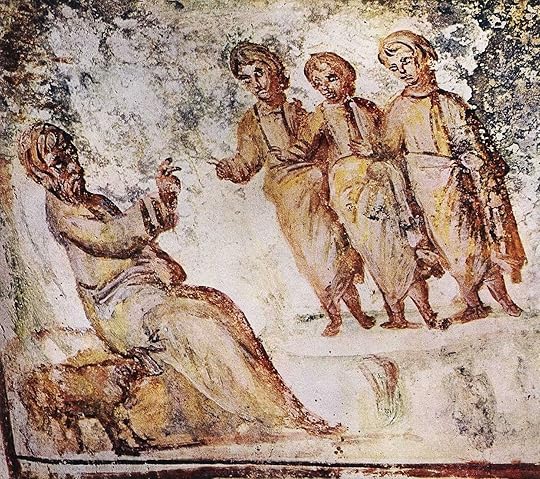
Sarah laughs at God's redemptive promise because she's hearing God's redemptive promise for the first time.
Old Abraham never bothered to tell her.
Go back to Genesis chapter 12, to undo all that we had done at Babel and before God first made this promise to Abraham 25 years earlier. Abraham sat on this promise of God for almost three decades. Sarah's dearly beloved didn't bother to share with her what God had promised for both of them. It's true that her laugh is a cynical laugh, the opposite of faith. But that's because her husband didn't believe the promise enough to pass it on to her. It's funny. These are not impressive people. By the way when God first called him, Abraham left behind his home and his family and his belongings and his country. He left it all behind in order to go to the land that God would show him. Left everything behind, the reason Abraham here has servants whom he can order to grind and mead and bake, the reason Abraham here has not just a calf, but a whole herd of cattle which he can feed his guests with.
The reason he has so much is because back in Egypt, back when his wife was young and beautiful, Abraham passed Sarah off as his sister and pimped her out to the Pharaoh. He lied about her. And then with dollar signs in his eyes, he rented her out for money, which I'm guessing required more than chocolates and roses to reconcile.
The wealth that Abraham lavishes on his mysterious guests in Genesis chapter 18, it was ill-gotten gain, which means God has been eating and drinking with sinners from the very beginning.And but before you start feeling sorry for Sarah, remember, turn the page on today. And Sarah is the one who will pitch a jealous fit and demand that her husband forsake their servant girl and her baby to the wilderness. And God only knows what else.
What a joke— of all the people in the world the God who knows the secret thoughts of all of our hearts, chose these two for his redemptive purpose. These two lying and pimping and coveting and conniving and unbelieving and ungodly, even. These two people to whom God gives this promise.
They're not even God's people. They are literally the ungodly.June 14, 2023
Paul's Big But

Tamed Cynic is a reader-supported publication. To receive new posts and all content, consider becoming a paid subscriber.
Romans 5
Years ago on Capital Hill Russell Vought, President Trump’s nominee to be deputy director of something-something, caused a sleepy session on CSPAN to result in raised eyebrows and spawned social media memes.
Senator Bernie Sanders turned to Russell Vought and, literally wagging his finger, shouted:
"Do you think that people who are not Christians are condemned?
Russell Vought, repeatedly, responded, ”I’m a Christian.”
To which Bernie raised his voice and bellowed at the nominee:
”I understand you are a Christian, but there are other people who have different religions in this country and around the world. In your judgment, do you think that people who are not Christians are condemned?”
Behind Bernie’s soapbox assault was a blog post Russell Vought wrote a year prior in support of his evangelical alma mater, Wheaton College. Wheaton had suspended a tenured professor whose views contradicted the school’s statement of faith and, during the ensuing controversy, Vought weighed in that “all are condemned apart from Jesus Christ.”
After wagging his finger, Bernie threw up his hands at Vought’s professed belief in the centrality of Jesus Christ for salvation and declared that his faith claims disqualified him from serving his country through civil service.
Wheaton College’s Statement of Faith isn’t substantively different than the confessions of any other Christian tradition. Wheaton College might put differently than the United Methodist Church, but neither Wheaton nor Vought said anything contrary to what we say when we recite in the Apostles Creed, “I believe in Jesus Christ his only Son our Lord…who will come again to judge…”
I’m not a Bernie fan; I only have room in my life for one socialist Jew. But what Christians said in response to Sanders, to Bernie’s inflammatory rhetoric.
Russell Moore of the Southern Baptist Convention pointed to the Bible, “Christians don't believe that we are constructing our faith. We believe that it's been handed to us by God.”
Okay. That’s true.
Still Christians bypassed the creeds and pointed to the Constitution and the manner in which Bernie’s religious prejudice violated the Constitution’s religious protection.
Again, that’s true even if it’s a tepid Christian response.
Vought himself said he believes “that all individuals are made in the image of God and are worthy of dignity and respect regardless of their religious beliefs.”
That’s vanilla and generic but still, it’s correct.
But I’m surprised those were the only types of answers offered by Christians.
"Do you think that people who are not Christians stand condemned? I’m a Jew, do you believe I am condemned as well?”
Bernie asked.
And of course, the simple answer, the straight-up answer, the direct and unambiguous answer, the Gospel which Russell Vought and Russell Moore and Pope Francis and Mother Theresa and the Apostle Paul all proclaim— the answer is “Yes.”
Yes, you stand condemned.
Yes, they stand condemned.
And so do I.
I stand condemned.
And so do you.

Jason Micheli's Blog
- Jason Micheli's profile
- 13 followers



